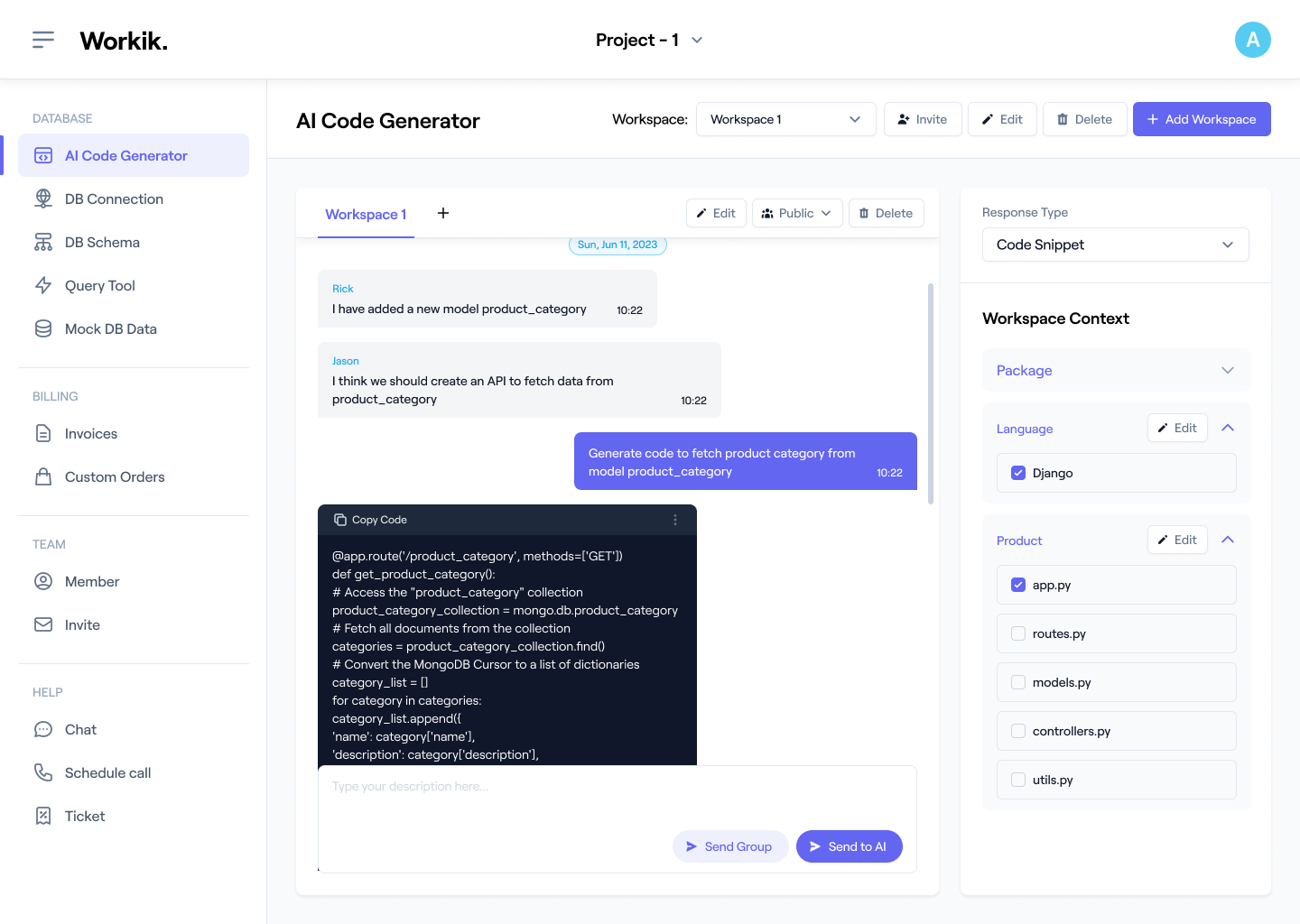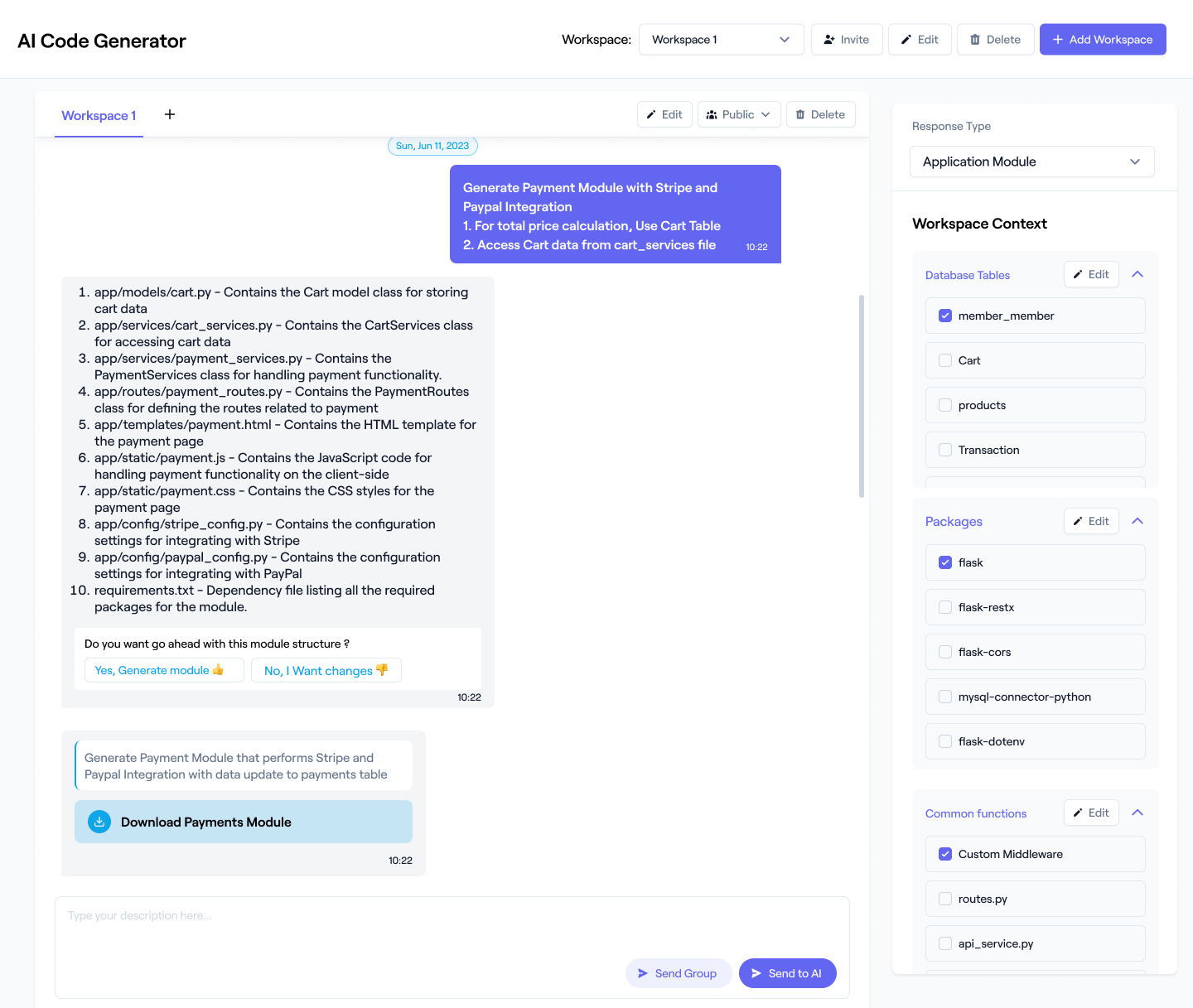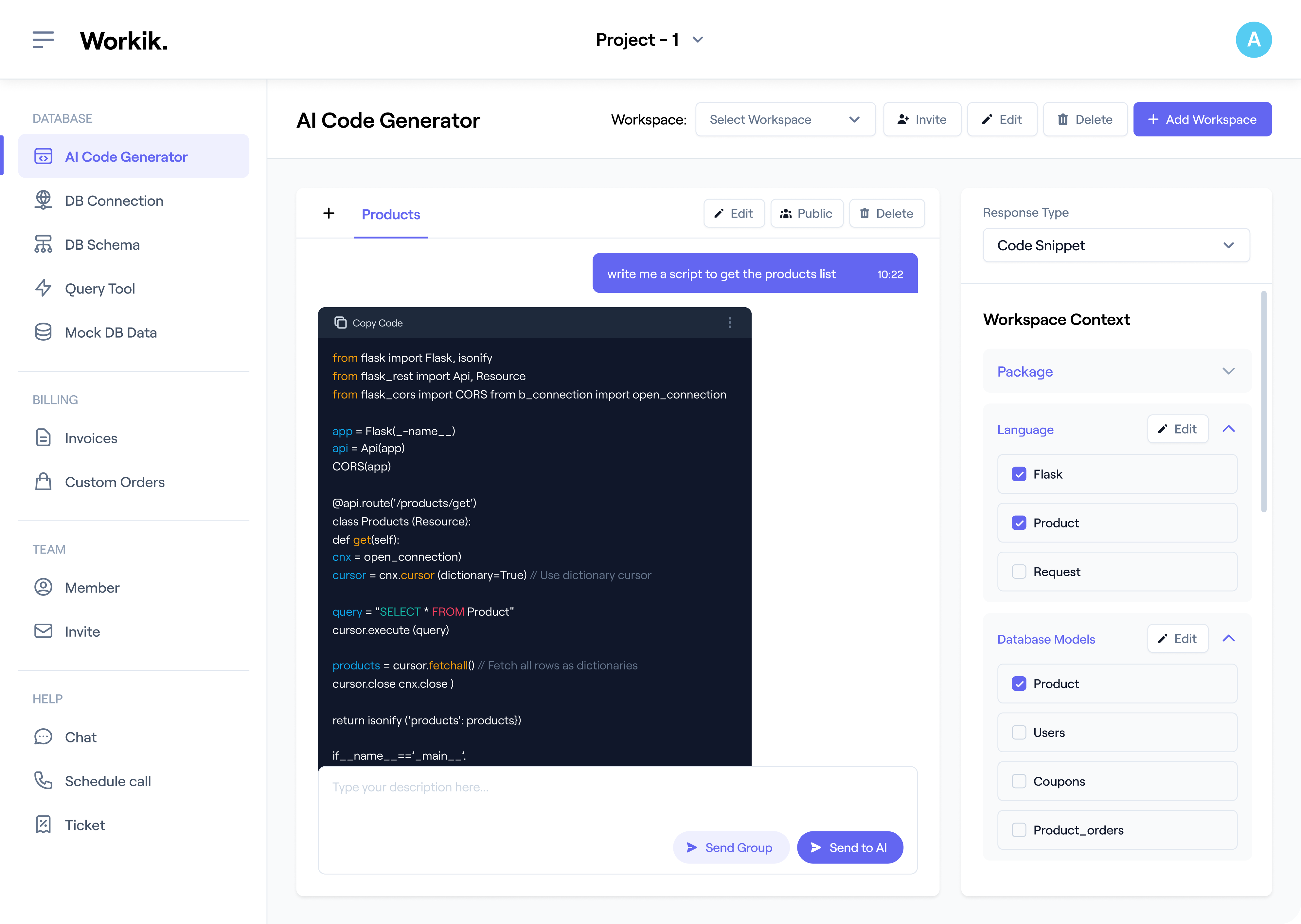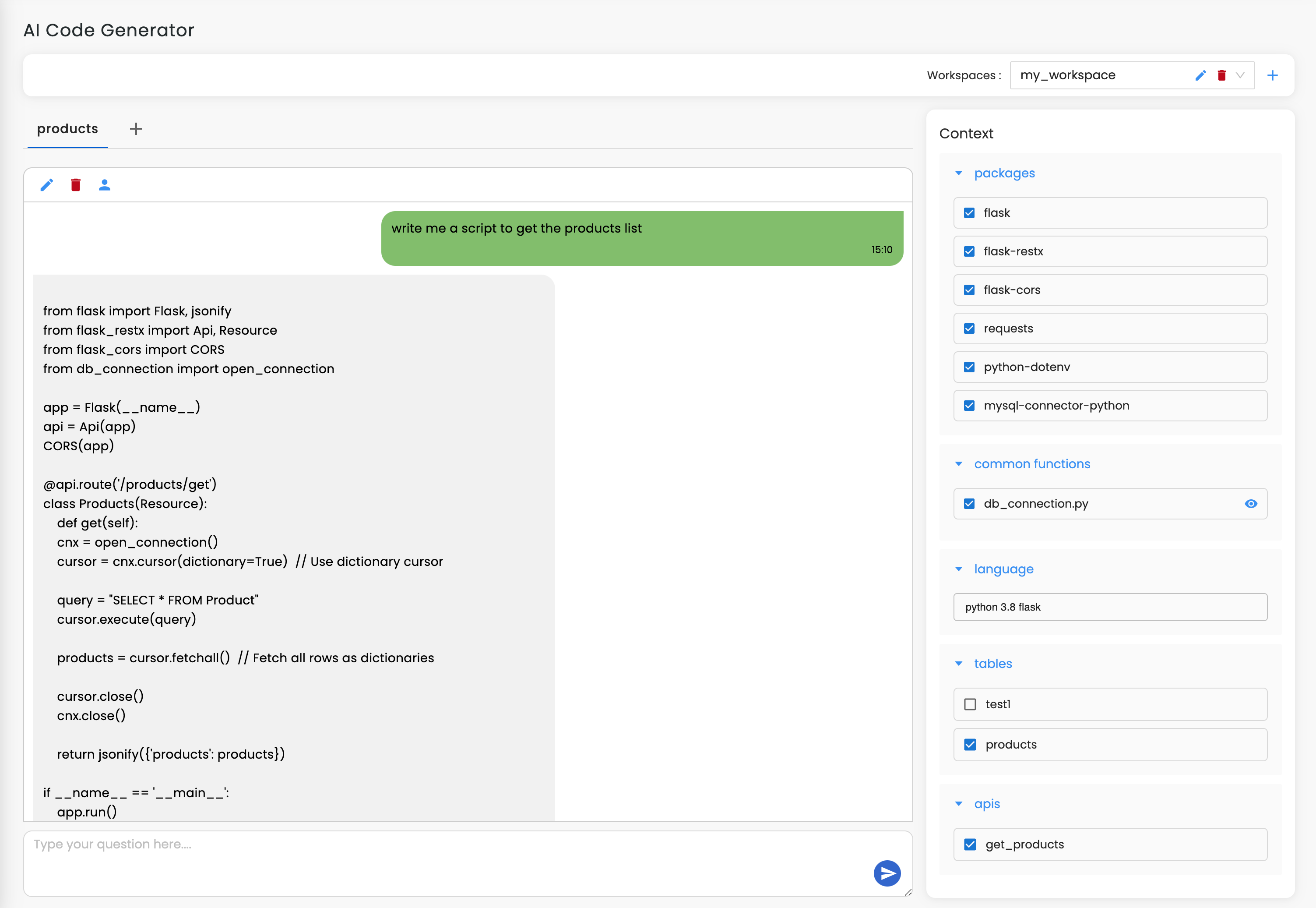Join our community to see how developers are using Workik AI everyday.
Supported AI models on Workik
GPT 5.2 Codex, GPT 5.2, GPT 5.1 Codex, GPT 5.1, GPT 5 Mini, GPT 5
Gemini 3.1 Pro, Gemini 3 Flash, Gemini 3 Pro, Gemini 2.5 Pro
Claude 4.6 sonnet, Claude 4.5 Sonnet, Claude 4.5 Haiku, Claude 4 Sonnet
Deepseek Reasoner, Deepseek Chat, Deepseek R1(High)
Grok 4.1 Fast, Grok 4, Grok Code Fast 1
Models availability might vary based on your plan on Workik
Features

Design Tailored Algorithms
Use AI to generate algorithms for tasks like sorting, searching, and optimization to ensure efficiency and adaptability.

Implement Algorithm Coding
AI can create production-ready code in popular languages like Python, Java, and C++, adhering to clean code standards.

Enhance Algorithm Performance
AI evaluates computational complexity and suggests optimizations to improve runtime and resource usage.

Simplify Problem Solving
AI assists in translating real-world problems into algorithmic solutions, streamlining the development process for scalability and accuracy.
How it works


Expand


Expand


Expand


Expand


Expand


Expand


Expand


TESTIMONIALS
Real Stories, Real Results with Workik
I love how the AI adapts to my coding style! It makes building scalable algorithms for our apps seamless and stress-free.

John Patel
Full-Stack Developer
Integrating with GitHub and setting up context was a breeze. Workik AI generated optimized algorithms for our financial models.

Liam Rodriguez
DevOps Engineer
Workik AI is a game-changer for time-sensitive projects. It drastically cuts down the time needed to fine-tune and optimize algorithms.

Emily Davis
Lead Data Scientist
What are some popular use cases of Workik’s AI Algorithm Generator for developers?


Workik’s AI algorithm generator assists developers with tasks such as:
1. Generate efficient algorithms for tasks like sorting, searching, graph traversal, and optimization problems.
2. Refactor and optimize algorithms to improve time and space complexity for better performance.
3. Seamlessly convert algorithms between programming languages to meet project requirements.
4. Automate unit testing and detect inefficiencies in algorithms for faster debugging.
5. Generate algorithms tailored for large-scale data processing, including machine learning models and data analysis tasks.
How does context-setting work in Workik, and what can I add for algorithm generation?


Workik allows various context-setting options for algorithm generation, including:
1. Specify programming languages like Python, Java, or C++.
2. Define libraries such as NumPy and Pandas for tailored algorithms.
3. Add database schemas for generating data-centric solutions.
4. Choose algorithm types, including dynamic programming or sorting.
5. Integrate with codebases from GitHub, GitLab, or Bitbucket.
6. Set constraints like time complexity and input size for precise customization.
Can Workik AI handle large-scale algorithm generation for enterprise-level projects?


Absolutely! Workik AI can generate scalable, high-performance algorithms tailored for distributed systems, cloud infrastructures, and big data processing. For instance, it can design MapReduce algorithms for data analysis or optimize load-balancing algorithms for multi-server setups.
How does Workik AI help debug complex algorithms?


Workik AI evaluates time and space complexity, pinpointing inefficiencies and offering actionable suggestions. It highlights edge cases by simulating diverse input scenarios, helping developers refine sorting, graph traversal, or dynamic programming algorithms to prevent failures.
How does Workik AI support parallel computing workflows?


Workik AI can generate algorithms using frameworks like Apache Spark or CUDA. For example, it can create parallelized sorting or matrix multiplication algorithms to accelerate processing on multi-core systems or GPUs.
Does Workik AI assist with energy-efficient algorithm generation?


Absolutely! Workik AI optimizes algorithms for energy efficiency by reducing redundant computations and streamlining execution paths. For instance, it can create optimized scheduling algorithms for battery-powered IoT devices or green data centers.
Can Workik AI create algorithms for hybrid computing environments?


Yes, Workik AI designs algorithms that function seamlessly across hybrid environments, combining on-premises systems with cloud infrastructures. For example, it can generate data-splitting logic to distribute workloads between a local server and AWS Lambda for cost-effective scalability.
Can't find the answer you are looking for?
Request question

Generate Code For Free

AI Algorithm Generation Question & Answer
An algorithm is a step-by-step procedure or set of rules designed to solve a specific problem or perform a task. It serves as a blueprint for computations, enabling tasks like sorting data, searching, or optimizing processes. Algorithms are foundational to programming and are implemented using various languages and frameworks.
Programming Languages:
Python, Java, C++
Data Manipulation:
Pandas, NumPy
Machine Learning:
TensorFlow, PyTorch, Scikit-learn
Graph Algorithms:
NetworkX
Distributed Computing:
Apache Spark MLlib
Optimization:
Optuna, Hyperopt
Testing Frameworks:
unittest, pytest
Performance Enhancement:
Numba, Cython
Generate efficient solutions for large datasets.
Create algorithms for tasks like shortest path, spanning trees, or network flow.
Solve complex problems in areas like scheduling, route planning, and resource allocation.
Generate algorithms for regression, classification, and clustering.
Automate algorithms for data cleaning, aggregation, and transformation.
Professionals skilled in AI algorithm generation can pursue roles such as Machine Learning Engineer, AI Researcher, Data Scientist, Optimization Specialist, Algorithm Developer, Full-stack Developer, and Backend Developer.
Algorithm Design:
Generates custom algorithms based on your problem specifications.
Optimization:
Refactors algorithms for performance improvements, such as reducing time and space complexity.
Code Conversion:
Translates algorithms across languages like Python, Java, and C++.
Automation:
Helps with testing, debugging, and integration of generated algorithms into your projects.
Context Integration:
Uses your codebase, libraries, and databases to generate more accurate, project-specific algorithms.
Collaboration:
Enables teams to work collaboratively on algorithm design and optimization through shared workspaces.
4.73 out of 5, based on 1338 reviews
Explore more on Workik
Get in touch
Don't miss any updates of our product.
© Workik Inc. 2026 All rights reserved.

